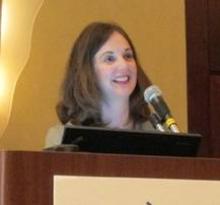MINNEAPOLIS – Increased levels of the stress biomarker alpha-amylase, but not cortisol, are significantly associated with a lower chance of conception, a couple-based, prospective study has shown.
The odds of pregnancy were slashed 31% for women whose salivary levels of alpha-amylase were in the highest tertile, compared with women whose levels were in the lowest tertile after adjustment for such important confounders as the difference between partners’ ages, intercourse during the fertile window and the woman’s age, income, race, parity, smoking, caffeine intake, and alcohol use (odds ratio, 0.69).
This study is the first in the United States to prospectively examine the association between physiologic stress and fecundity among couples trying to conceive, lead author Courtney D. Lynch, Ph.D., said at the annual meeting of the Society for Pediatric and Perinatal Epidemiologic Research.
"We previously published similar results in a population in the U.K., and we were quite astounded that we found exactly the same thing," she said.
In that study (Fertil. Steril. 2011;95:2184-9), alpha-amylase was negatively associated with fecundity in the first cycle of attempting pregnancy (OR, 0.85) after adjustment for the couples’ age, intercourse frequency during the fertile window, and female alcohol use.
The current analysis was based on 501 couples in Michigan and Texas who were attempting pregnancy and were followed for up to 12 months and then through pregnancy, if pregnancy occurred, as part of the LIFE (Longitudinal Investigation of Fertility and the Environment) study. Cortisol and alpha-amylase concentrations were determined by enzyme immunoassay from salivary samples collected by the women on the day following enrollment and the day following the start of their first menses in the study.
The women, aged 18-40 years, were mostly white (78%), college graduates (75%), and nonsmokers (73%). Their mean age was 30 years, 53% were nulliparous, and 55% were overweight or obese.
Of the 401 couples who completed the protocol, 87% achieved pregnancy and 13% did not.
Complete data evaluable on 393 couples showed no significant differences between women who did or did not become pregnant in mean levels of cortisol (0.46 μg/dL vs. 0.36 μg/dL) or alpha-amylase (23.6 U/mL vs. 32.0 U/mL), said Dr. Lynch, an epidemiologist at Ohio State University in Columbus.
The adjusted odds of pregnancy were similar for women with salivary cortisol in the lowest tertile (0.02-0.30 μg/dL; OR, 1.0), middle tertile (0.31-0.42 μg/dL; OR, 0.90), or highest tertile (0.43-15.60 μg/dL; OR, 0.91).
The adjusted odds of pregnancy were significantly diminished, however, for women with alpha-amylase levels in the middle (10.5-23.6 U/mL; OR, 0.89) or highest tertile (23.7-379.0 U/mL; OR, 0.69), compared with the lowest tertile (0.4-10.4 U/mL; OR, 1.0), she said.
The investigators also used Bayesian statistical techniques to identify the fertile window and estimate day-specific probabilities of conception, taking into account the relevant covariates. Based on this analysis, the probability of pregnancy on day 1 of the fertility window for a 30-year-old, nonsmoking white woman with a partner 2 years older than she and all other covariates centered at the mean, was 26% for women in the lowest alpha-amylase tertile, 24% in the middle tertile, and 20% in the highest tertile, Dr. Lynch said.
The results of a similar analysis in the U.K. cohort showed that conception probabilities increased with increasing quartiles of cortisol for each day during the fertile window, but that the opposite was true for alpha-amylase, as increasing quartiles reduced all day-specific probabilities of conception. The opposing direction of fecundity odds ratios provides evidence that the reduction in fecundity associated with alpha-amylase was mediated via the sympathetic nervous system rather than through the hypothalamic-pituitary-adrenal axis, Dr. Lynch said.
Although the U.S. analysis could not assess the effect of stress over time with only two salivary samples, the data lend further support to the existence and directionality of the stress and fecundity association, she said.
Despite a plethora of evidence that stress negatively impacts pregnancy outcomes, empiric data on stress and conception are surprisingly sparse. A small prospective Australian study involving 13 women found no significant difference in urinary epinephrine, norepinephrine, or cortisol concentrations between conception and nonconception cycles (Hum. Reprod. 1997;12:2324-9).
A newly published study by Dr. Lynch and her colleagues also found no association between self-reported stress, anxiety and depression, and pregnancy after several confounders were controlled for in 339 women, aged 18-40, attempting to conceive (Fertil. Steril. 2012 June 13 [epub ahead of print]).
When asked by the audience how her two studies could come to such different conclusions, Dr. Lynch replied that "when you ask people if they are stressed, if people are chronically stressed they’re not going to perceive this day as any worse than another day in their situation, but that doesn’t mean the body doesn’t respond."


